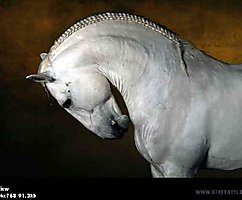How to choose an uninterruptable power supply for the heating system a country house
 Bashny.Net
Bashny.Net
In anticipation of the new heating season, many owners of country houses reflect on what will happen with the heating system in the event of a power failure. No matter what was the cause of the blackout — wires, overloading the substation or large-scale accident, remember the main rule. Modern heating system needs a reliable, uninterruptible power supply, which, if necessary, will be able to replace the main network.
So, in this article, you will learn:
Boiler room modern country home is a complex energy-dependent engineering system. For the smooth operation of the heating system requires a constant electricity supply the boiler and pumps, which provide circulation of coolant through the pipes. In the event of a power outage, the circulating pump stops working, disconnects the control unit of the boiler and the heating system stops.
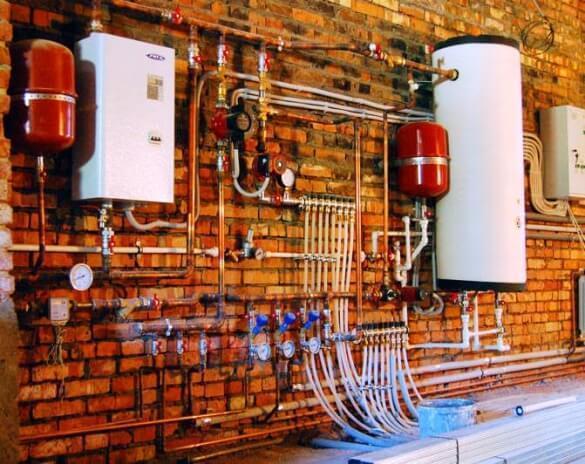
Prolonged power outage in winter is, in addition to a significant reduction in the level of comfort in a country house, can lead to the freezing of the heating system or to the emergency situation. For example, if the heart of the heating system yavlyaetsyaprostota solid fuel boiler, then the disappearance of electricity, immediately shut off the circulation pumps.
Wood or coal boiler, because of its design, will continue to work and will heat the coolant, which is not pumped through the pipes of the heating system. In the case that the fluid circulation in the heating system is a forced way (the coolant is pumped by pump), not mounted heating system with natural circulation (gravity), the coolant may boil, or in the worst case, just explode.
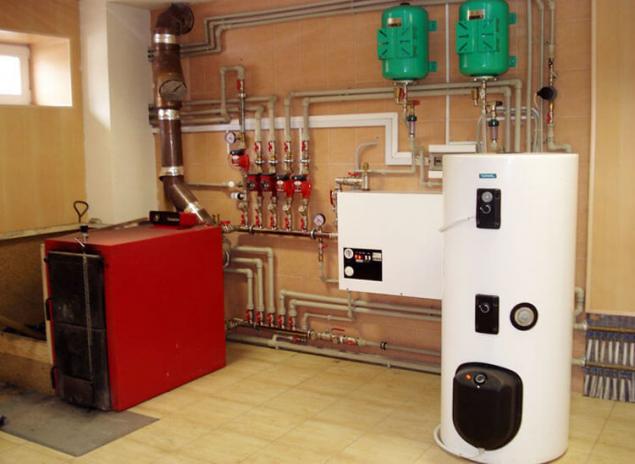
To avoid such problems you can, if you mount the backup power system of the heating equipment.
Reliable and trouble-free operation of modern boilers, such as gas, pellet or diesel, as well as the entire heating system fully depends on the availability at home of electricity. Electricity energizes the critical components of the boiler – circulation pump and electronic control unit. In the event of a power outage, the supply of heat is terminated.
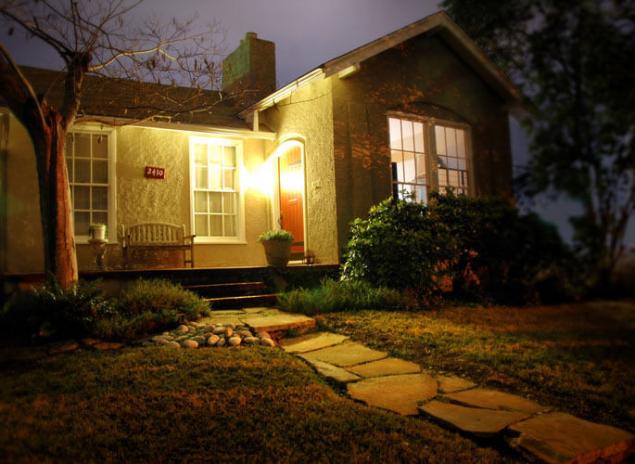
At first glance it seems that to mount a backup power system for the boiler — not very difficult. For example, it is sufficient to connect to the boiler cheap computer bespereboynik or to make a system based on conventional automotive batteries. This view is mistaken, because for boiler operation from the UPS need to meet certain requirements.
Choosing the right uninterruptible power supply
As mentioned above, the modern boiler is a sophisticated equipment, equipped with a microprocessor control unit, sensitive to voltage surges and, more importantly, to the quality of electricity.
UPS of this type, in addition to small capacity built-in battery, unable to provide long-term operation of the boiler equipment, it is not suitable for powering microprocessor boards boiler, because the control unit takes the square wave (or quasisinusoidal) as the error. Circulation pump if start, will work with the interruptions and noise are also significantly reduced its resource. In addition, expensive equipment can simply fail.
For the operation of the boiler, circulating pumps, in General, all devices is equipped with asynchronous motors, submersible, drainage and sewage pumps requires that the UPS only provides the pure sine wave output. Pure sine wave is required for some appliances that may be connected to the UPS, for example, a refrigerator, a video surveillance system.And this is only one of several important nuances that must be considered when choosing a UPS for the boiler. In addition to the output waveform, it is necessary to consider the possibility of a UPS to withstand high inrush currents. This is because many devices, for example, the submersible pumps themselves are already powerful enough consumer of electricity, at the start increase the consumption of 2-3 times their rated power.
Here: one of the most important characteristics is the ability of a UPS to withstand a 2-bedroom/3-fold excess power from the nominal value for 15 to 30 seconds. But in General, always pick UPS for the boiler with the necessary supply as the UPS capacity and battery capacity on the basis of a sufficient supply of electricity to all consumers.
Go ahead. The principle of operation of backup power can be described by a simple algorithm. When included in the network via a built in UPS charger will charge battery or batteries (if you use multiple batteries). At the same time via UPS is the supply of electricity to consumers, boiler, circulation pumps, etc. When the battery is full the charger automatically turns off and the system power directly from the mains through the UPS in so-called normal mode.
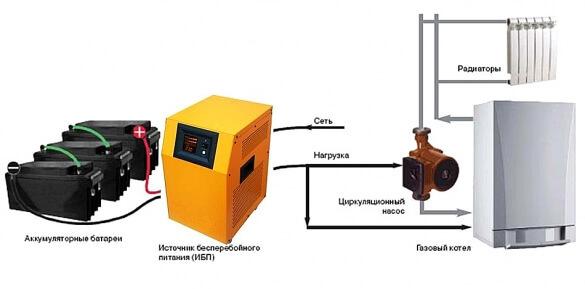
In the event of a power outage the UPS will provide power from a battery (converting it from DC to AC 220 V, 50 Hz) to the boiler and other connected equipment. Power will exercise until, until you restore the power supply at home, or not yet discharged batteries.
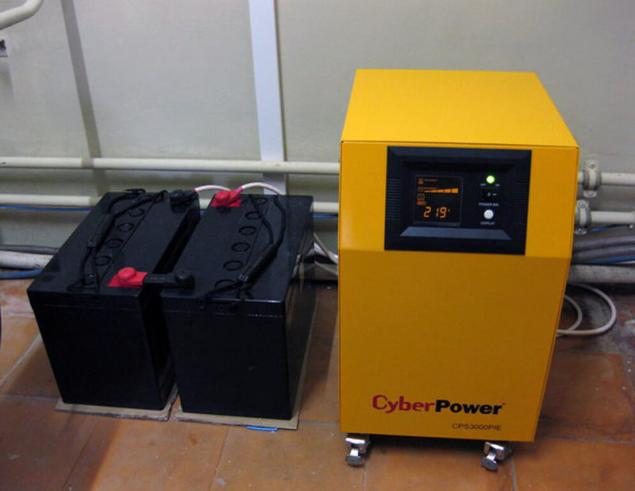
If the addition of copper it is necessary to power the pump of the local sewage treatment plant, water supply pump, etc., the capacity of the UPS is calculated from total electricity consumption by all consumers.Also, when selecting bespereboynik for the boiler, you need to decide on a number of key requirements that apply to this equipment. According to the principle of all UPS's are divided into three major groups.
Off-line (off-line) UPS. Line-interactive device. Online (on-line) models of continuous operation. Off-line bespereboynik not have a built-in stabilizer, and in the settings fixed the range of acceptable voltage, for example from 180 to 250 V. During the lowering or voltage beyond the input voltage range (as is often the case in rural settlements), the device will regard it as a signal to switch power boiler from batteries. When returning the voltage level to the set values the UPS will switch on again the power from the main network. I.e. when all the races will occur unnecessarily frequent switching of the UPS: mains/batteries.
In addition to the lack of protection of connected equipment from power surges, the work of the UPS in this mode will cause frequent cycle charge/discharge of the batteries, reducing their service life. In addition, when you select a UPS of this type, it additionally have to buy a stabilizing device for equipment protection.
Online bespereboyniki, UPS or continuous, are, at first glance, the best equipment suitable for use in conjunction with the heating boiler, demanding quality voltage and frequency. UPS of this type, due to its design features, "pull" the voltage to the desired quality by providing consumers 220 V 50 Hz.
This UPS has the inverter which operates in a double conversion of incoming current. Ie first alternating current is converted to DC and then he converted again at the right of the apparatus alternating current of stable quality. With all the advantages of online topology, has one significant disadvantage, which is necessary to pay attention.
Due to the fact that the system works on the principle of double conversion battery pack connected all the time involved. It is at times compared to line-interactive topology reduces the service life of batteries, and the batteries in turn are quite expensive in small capacities covering at a cost of the UPS itself.
Important point: typically, the initial power of the UPS with external batteries the voltage is 12 V or 24 V and further on — 36, 48 V, depending on power, i.e. when the 24 V connection is required at least 2 batteries, which is not always economically feasible. So choosing a quality UPS, look at its technical characteristics, will he be able to work on the essential minimum, i.e. from the 1st battery of 12 V.
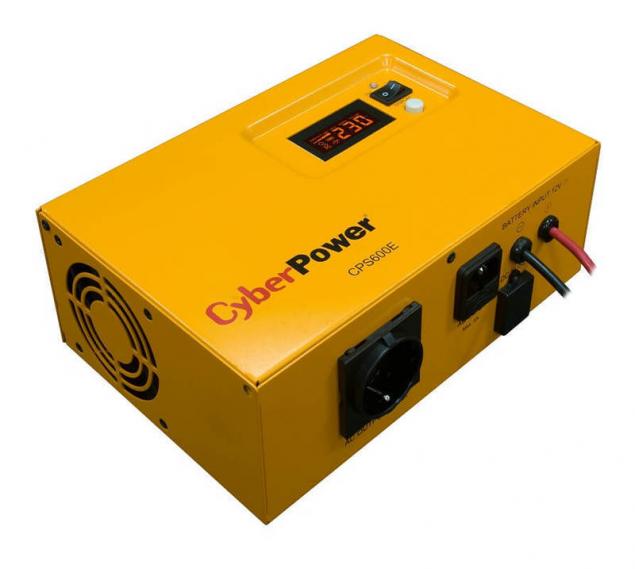
The weight of the equipment can also serve as an indirect sign of its specified characteristics, for example, a pure sine wave is achieved by equalizing the signal with a powerful transformer. That is because of design features of the UPS with a capacity of 2.5 kW can not weigh, for example, 10 kg. Weight of a system of similar power without batteries will be at least 30 kg.
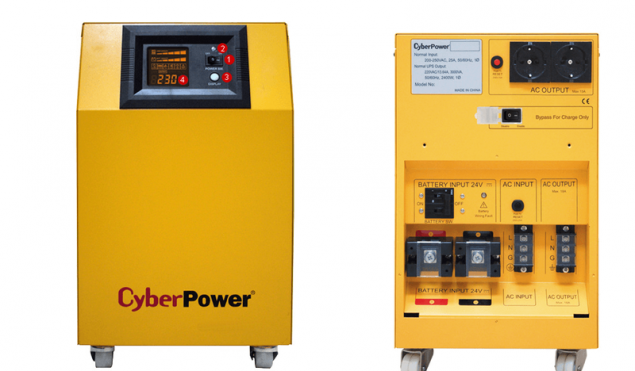
Also pay attention to the transfer speed modes switching battery/network (the switching time should not exceed 6 m/s 10 m/s), the maximum number of batteries that can be connected to the UPS. The last parameter is important if in the future we plan to expand the system's capabilities and increasing the capacity of batteries connected to a backup power system for more consumers or increase the time of Autonomous work.
The choice of battery for uninterruptible power supply
The cost of batteries could reach over 50% of the price of the entire system uninterruptible power supply. So their choice should be treated as responsibly as to the choice of battery backup. At the same time to build batteries for power backup systems must meet specific requirements.
The question arises, what to choose? Remember the second rule: for use with the UPS best suited gel battery GEL (Gelled Electrolite) or a battery built in AGM technology (Absorptive Glass Mat). Despite obscure at first glance, the abbreviation, both types of batteries are lead acid, but differ from other types of used technology.
In AGM batteries between the lead plates are tightly compressed with the two sides of the fiberglass Mat separators (they act like a sponge, not allowing the acid to flow), impregnated with electrolyte.
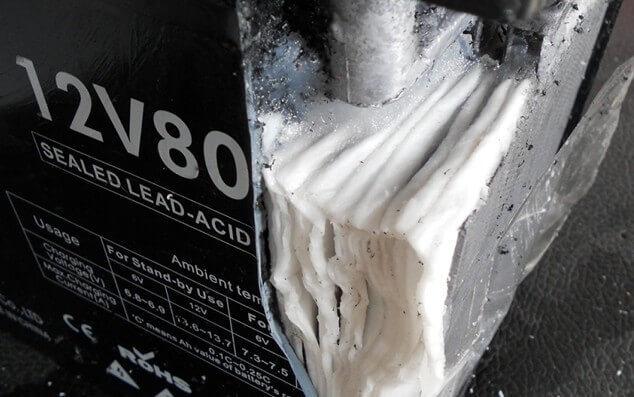
In GEL batteries the electrolyte is also located between the plates, but by adding silicon dioxide it is brought to a gelatinous mass of gel.
Hence, the electrolyte in these maintenance-free batteries do not spill. In the course of chemical reactions of gases, the water splits into hydrogen and oxygen, but in the recombination, the ions of these chemical elements do not evaporate and remain in the closed sealed space of the battery, "returning" back into the electrolyte which retains its properties for 5-10 years.
This increases the service life of the backup power supply system of the boiler, and both types of batteries can be used in closed premises equipped with natural ventilation system.
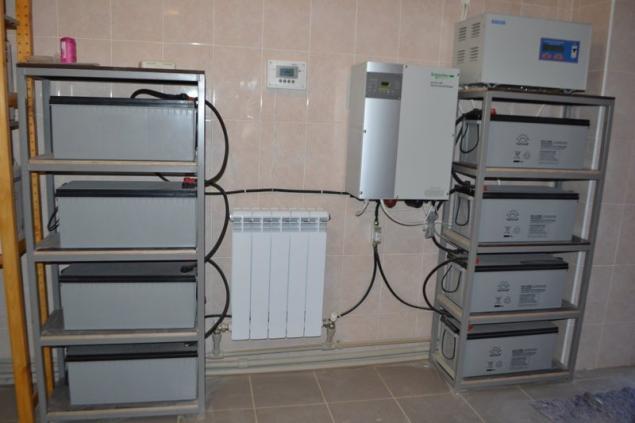
Advantages of batteries of these types can be distinguished: the possibility of operating in a wide temperature range from -30 to + 50-60 °C. they can be installed in any position but is not recommended by the manufacturer upside down.
In the asset AGM batteries (at the same capacity) is lower price than the gel, higher power output current (which is important when you are running powerful equipment such as a pump), high speed charging. But batteries of this type do not "carry" nedoskazki and less work on deep discharge. In the case of nedoskazannosti discharge of the battery (for example, re-turned off the light, and the boiler works again from the UPS) the battery capacity is irreversibly reduced.
Conclusions: when building individual uninterruptible power supply system of the heating system of the cottage it is necessary to consider many nuances, ranging from equipment selection, calculation of power UPS and ending with the installation of the equipment. published
Source: www.forumhouse.ru/articles/engineering-systems/6893
So, in this article, you will learn:
- What the boiler requires a backup source of electricity.
- How to choose an uninterruptible power supply (UPS/UPS).
- What are the nuances you need to consider when choosing a battery for the UPS.
Boiler room modern country home is a complex energy-dependent engineering system. For the smooth operation of the heating system requires a constant electricity supply the boiler and pumps, which provide circulation of coolant through the pipes. In the event of a power outage, the circulating pump stops working, disconnects the control unit of the boiler and the heating system stops.

Prolonged power outage in winter is, in addition to a significant reduction in the level of comfort in a country house, can lead to the freezing of the heating system or to the emergency situation. For example, if the heart of the heating system yavlyaetsyaprostota solid fuel boiler, then the disappearance of electricity, immediately shut off the circulation pumps.
Wood or coal boiler, because of its design, will continue to work and will heat the coolant, which is not pumped through the pipes of the heating system. In the case that the fluid circulation in the heating system is a forced way (the coolant is pumped by pump), not mounted heating system with natural circulation (gravity), the coolant may boil, or in the worst case, just explode.

To avoid such problems you can, if you mount the backup power system of the heating equipment.
Reliable and trouble-free operation of modern boilers, such as gas, pellet or diesel, as well as the entire heating system fully depends on the availability at home of electricity. Electricity energizes the critical components of the boiler – circulation pump and electronic control unit. In the event of a power outage, the supply of heat is terminated.

At first glance it seems that to mount a backup power system for the boiler — not very difficult. For example, it is sufficient to connect to the boiler cheap computer bespereboynik or to make a system based on conventional automotive batteries. This view is mistaken, because for boiler operation from the UPS need to meet certain requirements.
Choosing the right uninterruptible power supply
As mentioned above, the modern boiler is a sophisticated equipment, equipped with a microprocessor control unit, sensitive to voltage surges and, more importantly, to the quality of electricity.
UPS of this type, in addition to small capacity built-in battery, unable to provide long-term operation of the boiler equipment, it is not suitable for powering microprocessor boards boiler, because the control unit takes the square wave (or quasisinusoidal) as the error. Circulation pump if start, will work with the interruptions and noise are also significantly reduced its resource. In addition, expensive equipment can simply fail.
For the operation of the boiler, circulating pumps, in General, all devices is equipped with asynchronous motors, submersible, drainage and sewage pumps requires that the UPS only provides the pure sine wave output. Pure sine wave is required for some appliances that may be connected to the UPS, for example, a refrigerator, a video surveillance system.And this is only one of several important nuances that must be considered when choosing a UPS for the boiler. In addition to the output waveform, it is necessary to consider the possibility of a UPS to withstand high inrush currents. This is because many devices, for example, the submersible pumps themselves are already powerful enough consumer of electricity, at the start increase the consumption of 2-3 times their rated power.
Here: one of the most important characteristics is the ability of a UPS to withstand a 2-bedroom/3-fold excess power from the nominal value for 15 to 30 seconds. But in General, always pick UPS for the boiler with the necessary supply as the UPS capacity and battery capacity on the basis of a sufficient supply of electricity to all consumers.
Go ahead. The principle of operation of backup power can be described by a simple algorithm. When included in the network via a built in UPS charger will charge battery or batteries (if you use multiple batteries). At the same time via UPS is the supply of electricity to consumers, boiler, circulation pumps, etc. When the battery is full the charger automatically turns off and the system power directly from the mains through the UPS in so-called normal mode.

In the event of a power outage the UPS will provide power from a battery (converting it from DC to AC 220 V, 50 Hz) to the boiler and other connected equipment. Power will exercise until, until you restore the power supply at home, or not yet discharged batteries.

If the addition of copper it is necessary to power the pump of the local sewage treatment plant, water supply pump, etc., the capacity of the UPS is calculated from total electricity consumption by all consumers.Also, when selecting bespereboynik for the boiler, you need to decide on a number of key requirements that apply to this equipment. According to the principle of all UPS's are divided into three major groups.
Off-line (off-line) UPS. Line-interactive device. Online (on-line) models of continuous operation. Off-line bespereboynik not have a built-in stabilizer, and in the settings fixed the range of acceptable voltage, for example from 180 to 250 V. During the lowering or voltage beyond the input voltage range (as is often the case in rural settlements), the device will regard it as a signal to switch power boiler from batteries. When returning the voltage level to the set values the UPS will switch on again the power from the main network. I.e. when all the races will occur unnecessarily frequent switching of the UPS: mains/batteries.
In addition to the lack of protection of connected equipment from power surges, the work of the UPS in this mode will cause frequent cycle charge/discharge of the batteries, reducing their service life. In addition, when you select a UPS of this type, it additionally have to buy a stabilizing device for equipment protection.
Online bespereboyniki, UPS or continuous, are, at first glance, the best equipment suitable for use in conjunction with the heating boiler, demanding quality voltage and frequency. UPS of this type, due to its design features, "pull" the voltage to the desired quality by providing consumers 220 V 50 Hz.
This UPS has the inverter which operates in a double conversion of incoming current. Ie first alternating current is converted to DC and then he converted again at the right of the apparatus alternating current of stable quality. With all the advantages of online topology, has one significant disadvantage, which is necessary to pay attention.
Due to the fact that the system works on the principle of double conversion battery pack connected all the time involved. It is at times compared to line-interactive topology reduces the service life of batteries, and the batteries in turn are quite expensive in small capacities covering at a cost of the UPS itself.
Important point: typically, the initial power of the UPS with external batteries the voltage is 12 V or 24 V and further on — 36, 48 V, depending on power, i.e. when the 24 V connection is required at least 2 batteries, which is not always economically feasible. So choosing a quality UPS, look at its technical characteristics, will he be able to work on the essential minimum, i.e. from the 1st battery of 12 V.

The weight of the equipment can also serve as an indirect sign of its specified characteristics, for example, a pure sine wave is achieved by equalizing the signal with a powerful transformer. That is because of design features of the UPS with a capacity of 2.5 kW can not weigh, for example, 10 kg. Weight of a system of similar power without batteries will be at least 30 kg.

Also pay attention to the transfer speed modes switching battery/network (the switching time should not exceed 6 m/s 10 m/s), the maximum number of batteries that can be connected to the UPS. The last parameter is important if in the future we plan to expand the system's capabilities and increasing the capacity of batteries connected to a backup power system for more consumers or increase the time of Autonomous work.
The choice of battery for uninterruptible power supply
The cost of batteries could reach over 50% of the price of the entire system uninterruptible power supply. So their choice should be treated as responsibly as to the choice of battery backup. At the same time to build batteries for power backup systems must meet specific requirements.
The question arises, what to choose? Remember the second rule: for use with the UPS best suited gel battery GEL (Gelled Electrolite) or a battery built in AGM technology (Absorptive Glass Mat). Despite obscure at first glance, the abbreviation, both types of batteries are lead acid, but differ from other types of used technology.
In AGM batteries between the lead plates are tightly compressed with the two sides of the fiberglass Mat separators (they act like a sponge, not allowing the acid to flow), impregnated with electrolyte.

In GEL batteries the electrolyte is also located between the plates, but by adding silicon dioxide it is brought to a gelatinous mass of gel.
Hence, the electrolyte in these maintenance-free batteries do not spill. In the course of chemical reactions of gases, the water splits into hydrogen and oxygen, but in the recombination, the ions of these chemical elements do not evaporate and remain in the closed sealed space of the battery, "returning" back into the electrolyte which retains its properties for 5-10 years.
This increases the service life of the backup power supply system of the boiler, and both types of batteries can be used in closed premises equipped with natural ventilation system.

Advantages of batteries of these types can be distinguished: the possibility of operating in a wide temperature range from -30 to + 50-60 °C. they can be installed in any position but is not recommended by the manufacturer upside down.
In the asset AGM batteries (at the same capacity) is lower price than the gel, higher power output current (which is important when you are running powerful equipment such as a pump), high speed charging. But batteries of this type do not "carry" nedoskazki and less work on deep discharge. In the case of nedoskazannosti discharge of the battery (for example, re-turned off the light, and the boiler works again from the UPS) the battery capacity is irreversibly reduced.
Conclusions: when building individual uninterruptible power supply system of the heating system of the cottage it is necessary to consider many nuances, ranging from equipment selection, calculation of power UPS and ending with the installation of the equipment. published
Source: www.forumhouse.ru/articles/engineering-systems/6893
Tags
See also
Nissan has offered a new scope Li-Ion battery
Nissan will release a home battery xStorage
What to consider when choosing an uninterruptible power supply
How to choose a pump for Sewerage in private house
How to choose the best gas boiler-selection criteria of the best option
How not to get confused in choosing hair products
Operating experience of Uninterruptible Power Systems with solar panels in the "summer" conditions
Cottages: very practical and original
The system is intuitive eating by Steven hawks









